God Odin Was Exiled From Asgard – The Kingdom Of The Gods – But He Had No Regrets For Breaking Norse Society’s Norms
Ellen Lloyd - AncientPages.com - In Norse society, rules and laws were expected to be followed. Breaking norms led to an individual being shunned and suffering some consequence. Everyone could be punished for not following the rules. No one stood above the law, and gods were also expected to behave according to Norse standards.
The greatest of all Norse gods, Odin engaged in practices completely unacceptable in Norse society. As a result, God Odin was exiled from Asgard, the Kingdom of Norse gods. He was scorned and labeled unfit to be called a god.
However, this didn't bother Odin at all. He knew exactly what he had done and didn't regret it. Nothing stood between him and his ambitions.
As previously discussed on Ancient Pages, God Odin was probably the most complex figure of all the Norse Gods.
In the Norse pantheon, Odin is considered an ‘Allfather’ and ruler of Asgard, but he was never entirely to be trusted.
Odin was a god of magic, wisdom, and war, but his desire to gain knowledge was almost like an obsession.
It is said that the great Odin sacrificed an eye to Mimir, the Norse god of wisdom, in exchange for a drink from Mimir’s well located in Jötumheimr, one of the mysterious nine world of Yggdrasil.
God Odin And Norse Shamanism
In Norse mythology, Seidr is the practice of magic and shamanism. Shamans played a very important role in Norse society. These enigmatic beings were known for their unusual powers, and they were credited with the ability to alter destiny. Beings who mastered Seidr were, therefore, as much feared and respected by people and even the Norse gods.
God Odin and Goddess Freya practiced shamanism. To become a shaman, one had to go through a ritual that involved dying resurrection. This was the only way to gain divine powers. Odin underwent the ritual in the venture for the runes. The word “rune” comes from Old Norse and means “Secret knowledge and wisdom.” God Odin himself was regarded as the “Father of the Runes.” The Vikings believed runes were created when their chief god Odin speared himself to the cosmic world tree, Yggdrasil, hoping to receive secret knowledge.
The most powerful of the shamans was a völva, and her prophecies were feared among Vikings and Norse gods. Norns, known as ‘Shapers of Destiny’ in Norse mythology, were masters of Seidr.
God Odin's quest for knowledge led him to practice shamanism. He did gain supernatural powers and the knowledge he so deeply desired. Still, Odin was punished for his shamanistic practices and exiled from Asgard, the kingdom of the gods, for 9 years!
That a male should practice Seidr was unacceptable and loathsome because it required him to assume a woman's role, both sexually and socially. Men who practiced Seidr were called ergi (Old Norse for “unmanly”). In those days, it was the most horrible thing a man could be called. Men who pursued the practice of Seidr were banished from society, scorned, and laughed at. Practicing Seidr involved divination, clairvoyance, healing, bringing curses on individuals, and controlling the weather. It was something females were supposed to do.
So, naturally, God Odin had to suffer the consequences of becoming involved in the practice of Seidr. Not only was he exiled from Asgard, but he was also scorned for the feminine traits he adapted during the practice of Seiðr. To the pre-Christian Norsemen, his practice made him a transgender unfit to be a God.
God Odin was never embarrassed by this because his greatest ambition was to gain knowledge, and the practice of Seidr made him achieve his goal. God Odin’s shamanic spirit journeys were documented in the Ynglinga Saga and the Eddic poem - Baldur’s Dreams. Odin’s journey to the underworld with his eight-legged horse, Sleipnir, is also chronicled.
Updated on February 20, 2023
Written by Ellen Lloyd – AncientPages.com
Copyright © AncientPages.com All rights reserved. This material may not be published, broadcast, rewritten or redistributed in whole or part without the express written permission of AncientPages.com
More From Ancient Pages
-
 Yakhchals: Ingenious Ancient ‘Refrigerators’ Could Store Ice In The Hot Desert
Ancient Technology | Sep 15, 2018
Yakhchals: Ingenious Ancient ‘Refrigerators’ Could Store Ice In The Hot Desert
Ancient Technology | Sep 15, 2018 -
 Dark History Of Pömmelte, The German Stonehenge – What Can The Nebra Sky Disc And Archaeology Reveal?
Archaeology | Jul 3, 2018
Dark History Of Pömmelte, The German Stonehenge – What Can The Nebra Sky Disc And Archaeology Reveal?
Archaeology | Jul 3, 2018 -
 Chankillo: A 2300-Year-Old Solar Observatory in Peru
Civilizations | Sep 2, 2015
Chankillo: A 2300-Year-Old Solar Observatory in Peru
Civilizations | Sep 2, 2015 -
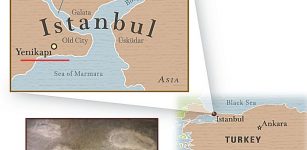 Yenikapı Excavations Reveal 8,500-Year-Old Artifacts
Archaeology | Jan 10, 2016
Yenikapı Excavations Reveal 8,500-Year-Old Artifacts
Archaeology | Jan 10, 2016 -
 1,000-Year-Old Bone Skate Found In Moravian City Of Přerov, Czech Republic
Archaeology | Mar 20, 2024
1,000-Year-Old Bone Skate Found In Moravian City Of Přerov, Czech Republic
Archaeology | Mar 20, 2024 -
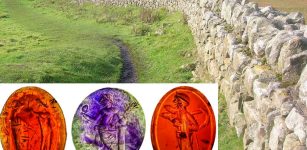 Amazing 2,000-Year-Old Engraved Roman Gems Discovered Near Hadrian’s Wall
Archaeology | Jan 30, 2023
Amazing 2,000-Year-Old Engraved Roman Gems Discovered Near Hadrian’s Wall
Archaeology | Jan 30, 2023 -
 On This Day In History: Sir Thomas Brisbane, Astronomer, Soldier And Governor Was Born – On July 23, 1773
News | Jul 23, 2016
On This Day In History: Sir Thomas Brisbane, Astronomer, Soldier And Governor Was Born – On July 23, 1773
News | Jul 23, 2016 -
 Hades – ‘The Unseen’ God Of The Dead, Fertility, Wealth And Earth’s Minerals
Featured Stories | Jun 2, 2020
Hades – ‘The Unseen’ God Of The Dead, Fertility, Wealth And Earth’s Minerals
Featured Stories | Jun 2, 2020 -
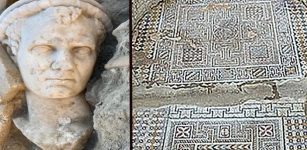 2,000-Year-Old Statue Of Priest’s Head Excavated In Laodicea On The Lycus
Archaeology | Dec 5, 2020
2,000-Year-Old Statue Of Priest’s Head Excavated In Laodicea On The Lycus
Archaeology | Dec 5, 2020 -
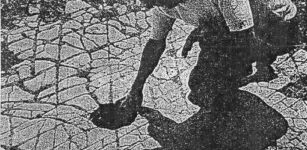 Oklahoma’s Ancient Mosaic Floor With Mysterious ‘Post Holes’ Could Re-Write History Of North America
Civilizations | Aug 10, 2018
Oklahoma’s Ancient Mosaic Floor With Mysterious ‘Post Holes’ Could Re-Write History Of North America
Civilizations | Aug 10, 2018 -
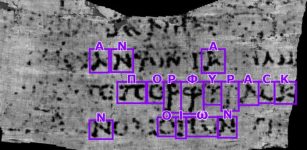 Major Breakthtrough – Ancient Herculaneum Scroll Deciphered For The First Time
Artifacts | Oct 20, 2023
Major Breakthtrough – Ancient Herculaneum Scroll Deciphered For The First Time
Artifacts | Oct 20, 2023 -
 Researchers Reconstruct Genome Of Centuries-Old E. Coli Using Fragments Extracted From An Italian Mummy
News | Jun 18, 2022
Researchers Reconstruct Genome Of Centuries-Old E. Coli Using Fragments Extracted From An Italian Mummy
News | Jun 18, 2022 -
 Rare Magic Mirror In Cincinnati Museum Has A Secret Hiding In Plain Sight
Artifacts | Jul 19, 2022
Rare Magic Mirror In Cincinnati Museum Has A Secret Hiding In Plain Sight
Artifacts | Jul 19, 2022 -
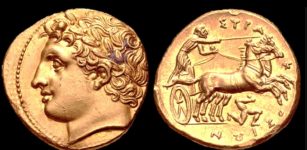 Agathocles Of Syracuse: Sicilian Ruler Who Committed Numerous Crimes Saved And Extended Sovereignty Of Sicily
Featured Stories | Jul 26, 2019
Agathocles Of Syracuse: Sicilian Ruler Who Committed Numerous Crimes Saved And Extended Sovereignty Of Sicily
Featured Stories | Jul 26, 2019 -
 Carbon-12 – A Critical Gateway To The Birth Of Life Is Produced In Stars – Did Life Come From Cosmos?
Human Beginnings | May 23, 2022
Carbon-12 – A Critical Gateway To The Birth Of Life Is Produced In Stars – Did Life Come From Cosmos?
Human Beginnings | May 23, 2022 -
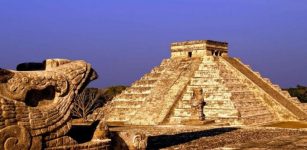 Bacabs: Four Atlantean Gods Were Giants And Sons Of Itzámna, Maya God Of Heaven And The Sun
Civilizations | Jun 12, 2017
Bacabs: Four Atlantean Gods Were Giants And Sons Of Itzámna, Maya God Of Heaven And The Sun
Civilizations | Jun 12, 2017 -
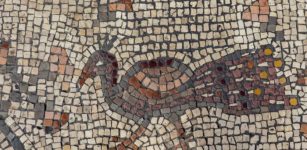 Biblical Mosaic Depicting Miracles Of Jesus Discovered At The ‘Burnt Church’ In Hippos
Archaeology | Sep 24, 2019
Biblical Mosaic Depicting Miracles Of Jesus Discovered At The ‘Burnt Church’ In Hippos
Archaeology | Sep 24, 2019 -
 Neanderthals Had Older Mothers And Younger Fathers Compared To Modern Humans
Archaeology | Apr 23, 2020
Neanderthals Had Older Mothers And Younger Fathers Compared To Modern Humans
Archaeology | Apr 23, 2020 -
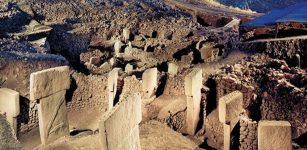 Ancient Astronomical Symbols At Göbekli Tepe Confirm A Comet Swarm Struck The Earth 11,000 B.C.
Archaeology | Apr 23, 2017
Ancient Astronomical Symbols At Göbekli Tepe Confirm A Comet Swarm Struck The Earth 11,000 B.C.
Archaeology | Apr 23, 2017 -
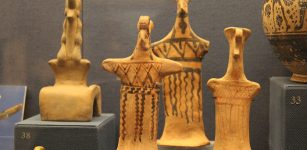 Mycenaean Culture Used Lignite For Their Kilns 3,000 Years Ago – Surprising Discovery Reveals
Archaeology | Jan 25, 2022
Mycenaean Culture Used Lignite For Their Kilns 3,000 Years Ago – Surprising Discovery Reveals
Archaeology | Jan 25, 2022


